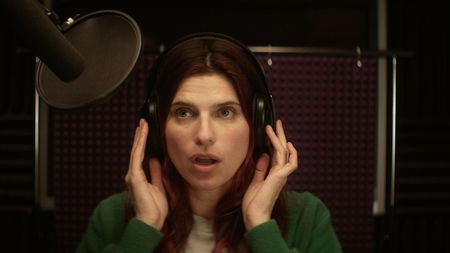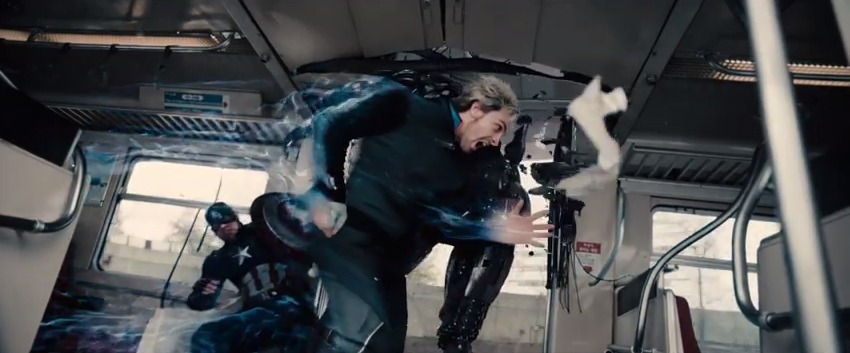Sebastian here with a heartfelt criticism of dubbing movies for foreign markets.
 Lake Bell in "In a World…," which isn't about dubbing, but it's a great movie and I needed a picture here.
Lake Bell in "In a World…," which isn't about dubbing, but it's a great movie and I needed a picture here.
This Monday I took a four hour train ride to see a movie.
I've done crazier things in the name of cinephilia. A few years ago I coerced my friends to take a day trip to Strasbourg just so I could see Steve McQueen's Shame three months before it opened here in Germany. But this time it was't about some small independent film. This time I went to all this trouble to watch a movie called Avengers: Age of Ultron. Maybe you've heard of it?
The superhero sequel had already been playing in German cinemas for a week and it's even playing in my small town. So why go elsewhere?
Because all the theaters near me are only showing the German-dubbed version. And that's not the movie I want to see.
The Guardian published an experiment of sorts recently on "how films survive the dubbing process," where Fred Wagner, a "non-German-speaking film lover living in Germany," saw four films (Inherent Vice, Chappie, Selma, and A Pigeon Sat on a Branch Reflecting on Existence) that had been dubbed into German, as the vast majority of foreign films playing in this country are. His conclusions about the "universality of the language of cinema" can be reproduced by anyone with a "mute"-button on their remote. Yes, a good film knows how to tell a story, how to inform the viewer about characters' traits and motivations through the image alone. Add score, source music, and sound work to create atmosphere and evoke emotions without the need to to hear (or be able to understand) a single line of dialogue.
But the assertion that a film can be successful without dialogue should not imply that an existing film does not suffer from removing its dialogue or having it replaced by words in another language...
Growing up in Germany meant, for virtually any media-consuming generation up until the most recent one, watching things dubbed. On TV, in theaters, on home video. From John Wayne to James Bond to Jason Bourne, from Captain Kirk to Columbo to Carrie Bradshaw, everybody's speaking German.
In my youth I began to discover a handful of ways to experience "Originalversionen." A friend's globetrotting big sister was commissioned to bring back VHS tapes of The X-Files and The Simpsons from the UK. I'd scan the TV guide up and down looking for that rare instance a film would be shown in "Zweikanalton," where the stereo channel was split into two tracks, one of the German dubbing, one of the original audio. But on a broad scale, it wasn't until the advent of the DVD around the turn of the century that dubbing was demoted from "mandate" to mere "option."
Dubbing is a compromise made to make media produced in one language accessible in another. It is not the only way to achieve this (subtitles are one alternative, learning the language another), but anybody choosing to watch a film dubbed is certainly free to do so. Those audiences need to be aware, though, that the version they are watching is, to put it mildly, incomplete.
It's not just about words getting replaced. The actors' voices, their intonations, breathing, choice of inflection or dialect or volume. None of it survives the dubbing process. And actors aren't the only ones whose work is lost or altered. Screenwriters, casting directors, editors, sound mixers, they all shape the final product. Film is the ultimate collaborative medium; to take the finished work, released to domestic audiences in (or as close as possible to) the form intended and approved by the filmmakers and just take out and replace the dialogue is akin to artistic lobotomy.
I am not alone in my strict stance against dubbing, yet the majority of German viewers still prefers the practice. DVDs and blu-rays come with original as well as dubbed audio tracks, and cinemas that occasionally show films in their native language are no longer limited to the biggest cities. But it's an esoteric tendency, and one that can cause quite the friction: I've witnessed more than one couple having an actual, full-fledged fight because one partner refused to watch a movie dubbed, the other to watch it anything but.
Personally, I've been lucky (or careful) enough to have never had my convictions in this regard tested by a loved one or close friend, but I had to defend(!) my preference numerous times, and listen to the same old arguments, again and again:
- "But not everybody understands English as well as you do!"
- "Reading subtitles is hard and distracts from watching the movie!"
- "Sometimes the dubbed version is actually better/funnier than the original!"
To which I say:
- I wasn't born speaking English. Or German. Humans are capable of learning languages. That's one of our defining traits as a species. In fact, watching movies in a foreign language is one way of becoming more familiar with it. Also: yes, my English's pretty good, but that leaves hundreds of other languages that I don't know. Yet I'm not watching French, or Spanish, or Russian, or movies in any other language dubbed, either. That's what subtitles are for.
- Yes, reading subtitles can take some getting used to. But what's so great about things that take some getting used to is that you can actually get used to them. It's right there in the name. And I honestly don't understand how some text on the bottom of the screen could possibly be more distracting than watching one person talk while the dislocated voice of a completely different person is played over them. It's objectively weird.
 As to that last point: there are a handful of oft-cited examples of dubbing studios taking it on themselves to drastically alter the tone of a work (like turning the dry dialogue of TV's The Persuaders into a barrage of slang and tongue-in-cheek one-liners), or replacing certain references they deem too obscure for German audiences with - in their estimate - more familiar ones.
As to that last point: there are a handful of oft-cited examples of dubbing studios taking it on themselves to drastically alter the tone of a work (like turning the dry dialogue of TV's The Persuaders into a barrage of slang and tongue-in-cheek one-liners), or replacing certain references they deem too obscure for German audiences with - in their estimate - more familiar ones.
My "favorite" example of this is an episode of The Simpsons where the name "Steve Guttenberg" was replaced with "Michael Jackson" even while a cartoon version of Guttenberg is shown on screen.
It is also common to hear German viewers say that some actors' overdubbed voices "just sound better" than their actual ones, which, in my experience, is more a matter of familiarity than anything else. When you've grown up with a certain voice to go with an actor's face, it can be quite alienating to hear them speak in their native language for the first time.
I grant that in some cases a dubbed film or TV show can be subjectively "better" than the original. This does not persuade me, however, of the practice's merits. When I am watching something, I want to see and hear it the way the filmmakers made it, warts and all. I don't care if some things can be made "better" or "funnier" or more accessible by changing them, and I don't care for a group of people that was hired to translate deciding it's their right to alter the product in such a way.
Do films "survive the dubbing process," as The Guardian put it? I'm not sure. But they certainly don't come out unharmed.
